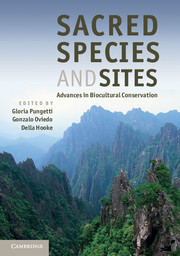Book contents
- Frontmatter
- Contents
- List of Contributors
- Foreword
- Preface
- Acknowledgements
- Introduction
- Part I Concepts and Knowledge
- 1 Sacred species and sites: dichotomies, concepts and new directions in biocultural diversity conservation
- 2 Spiritual values and conservation
- 3 Protected areas and sacred nature: a convergence of beliefs
- 4 Ancient knowledge, the sacred and biocultural diversity
- Part II Sacred Landscapes
- Part III Sacred Sites and People
- Part IV Sacred Species
- Part V Sacred Animals
- Part VI Sacred Groves and Plants
- Part VII Implementation and Conclusions
- Index
- Plate Section
- References
2 - Spiritual values and conservation
from Part I - Concepts and Knowledge
Published online by Cambridge University Press: 05 August 2012
- Frontmatter
- Contents
- List of Contributors
- Foreword
- Preface
- Acknowledgements
- Introduction
- Part I Concepts and Knowledge
- 1 Sacred species and sites: dichotomies, concepts and new directions in biocultural diversity conservation
- 2 Spiritual values and conservation
- 3 Protected areas and sacred nature: a convergence of beliefs
- 4 Ancient knowledge, the sacred and biocultural diversity
- Part II Sacred Landscapes
- Part III Sacred Sites and People
- Part IV Sacred Species
- Part V Sacred Animals
- Part VI Sacred Groves and Plants
- Part VII Implementation and Conclusions
- Index
- Plate Section
- References
Summary
Introduction
The history of nature conservation is largely a history of clashes of values.
It is not new, and not surprising, that the universal conservation paradigm of today represents an alternative set of values, and a response, to the value systems linked to the Industrial Revolution and the expansion of capitalism.
This modern conservation paradigm, in its many forms and developments, has often tried to explore links with ethical and cultural values, in one way or another. It has not always succeeded, however, and in fact in many instances its own sets of values have entered into conflict with beliefs and values that should have been at the core of its approach.
This is the case of spiritual values. For most of the conservation experts of the nineteenth and twentieth centuries, conservation had to be based on secular approaches rooted in natural sciences, and as such it was conceived as a universal paradigm where the only appreciated non-material values were those of aesthetics, personal contemplation and enjoyment, knowledge and planetary ethics. Not that all such values were bad – on the contrary, they were a great re-creation of ideals needed to moderate the desire for progress. However, spiritual values were largely absent.
The plight of indigenous values
When I was young I shared a large part of my life with indigenous communities of the Andes, and with them I learned about the many ways in which species and places had acquired special significance in their cultures.
- Type
- Chapter
- Information
- Sacred Species and SitesAdvances in Biocultural Conservation, pp. 28 - 35Publisher: Cambridge University PressPrint publication year: 2012



